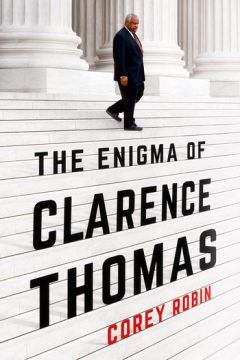Lidija Haas at Bookforum:
 TAKE A MINUTE NOW to write down the first associations that come to your mind regarding Clarence Thomas. You might note that he represents the extreme right wing of the Supreme Court and that, beginning his twenty-ninth term this fall, he is its longest-serving justice, not to mention Donald Trump’s personal favorite. No doubt you’ll think of his alleged sexual harassment of Anita Hill during his tenure at the Department of Education and when he was head of the Equal Employment Opportunity Commission under Ronald Reagan, of the ordeal she went through when forced to testify about it during his 1991 confirmation hearings, to no avail, and of his own infamous characterization of those hearings as a “high-tech lynching.” Perhaps his conspicuous quiet will come to mind, his refusal to say anything during oral arguments for years at a time—the New York Times reported somewhat breathlessly in 2016 that Thomas had just resumed speaking from the bench after keeping shtum for an entire decade. You may also recall the flurry of news coverage that ensued recently when, not content simply to go along with the majority opinion in Box v. Planned Parenthood of Indiana and Kentucky, which upheld Indiana’s right to require that aborted fetuses receive funerary rites, he added a long and fervent concurring opinion that connected abortion rights to eugenics and the US’s ugly history of forced sterilization. I’m guessing, though, that you probably wouldn’t start by describing Thomas as, in Corey Robin’s words, “a conservative black nationalist on the Supreme Court.”
TAKE A MINUTE NOW to write down the first associations that come to your mind regarding Clarence Thomas. You might note that he represents the extreme right wing of the Supreme Court and that, beginning his twenty-ninth term this fall, he is its longest-serving justice, not to mention Donald Trump’s personal favorite. No doubt you’ll think of his alleged sexual harassment of Anita Hill during his tenure at the Department of Education and when he was head of the Equal Employment Opportunity Commission under Ronald Reagan, of the ordeal she went through when forced to testify about it during his 1991 confirmation hearings, to no avail, and of his own infamous characterization of those hearings as a “high-tech lynching.” Perhaps his conspicuous quiet will come to mind, his refusal to say anything during oral arguments for years at a time—the New York Times reported somewhat breathlessly in 2016 that Thomas had just resumed speaking from the bench after keeping shtum for an entire decade. You may also recall the flurry of news coverage that ensued recently when, not content simply to go along with the majority opinion in Box v. Planned Parenthood of Indiana and Kentucky, which upheld Indiana’s right to require that aborted fetuses receive funerary rites, he added a long and fervent concurring opinion that connected abortion rights to eugenics and the US’s ugly history of forced sterilization. I’m guessing, though, that you probably wouldn’t start by describing Thomas as, in Corey Robin’s words, “a conservative black nationalist on the Supreme Court.”
more here.
